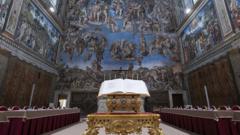The highly anticipated conclave to elect the 267th pope of the Catholic Church is officially underway, with 133 cardinals convening under the historic Sistine Chapel's iconic dome.
Voting for New Pope Commences as Cardinals Enter Secret Conclave

Voting for New Pope Commences as Cardinals Enter Secret Conclave
Historic election of the Catholic Church's next leader begins in Vatican City.
On a significant evening for the Catholic Church, 133 cardinals are set to gather in the Sistine Chapel to cast their votes for the next pope. The proceedings will commence with a mass at St. Peter's Basilica at 10:00 AM local time, led by Cardinal Giovanni Battista Re, the Cardinal Dean of the Vatican, who also officiated Pope Francis' funeral.
As the day progresses, mobile signals within Vatican City will be disabled to ensure a private voting environment. Around 4:15 PM, the cardinal electors will assemble in the Pauline Chapel, where they will begin their solemn procession to the Sistine Chapel, accompanied by hymns that invoke the Holy Spirit for guidance in their decision-making.
Upon entering the chapel, cardinals will take an oath of secrecy regarding the electing process while resting a hand on a Gospel. Following this, the Master of Pontifical Liturgical Celebrations, Diego Ravelli, will announce "extra omnes," marking the formal start of the conclave as they close themselves off from the outside world. Vatican officials have locked the entrances to maintain confidentiality, with Swiss guards ensuring security around the chapel.
During the voting process, Ravelli will distribute ballots, and the initial round of voting will take place soon after the conclusion of their sacred rituals. Although a new pope has not been elected on the first ballot for centuries, the first vote is crucial, as informed by Catholic commentator Austen Ivereigh. He notes that this initial round reveals which candidates are gaining traction among the cardinals.
Should the first vote fail to achieve the requisite two-thirds majority, cardinals will return to Casa Santa Marta for dinner, where discussions will continue in informal settings, with meal options designed to foster a discreet atmosphere. The process will involve essential dialogues among the electors, ultimately steering them toward a consensus on a papal candidate.
The conclave proceedings are set to continue with early morning mass and additional votes scheduled for the next day. As cardinals deliberate and pray, thousands await outside St. Peter's Basilica, eager for the white smoke plume that traditionally announces the election of a new pope. The future of the Catholic Church hangs in the balance, with speculation swirling around potential candidates and the various factions within the Church.
As the day progresses, mobile signals within Vatican City will be disabled to ensure a private voting environment. Around 4:15 PM, the cardinal electors will assemble in the Pauline Chapel, where they will begin their solemn procession to the Sistine Chapel, accompanied by hymns that invoke the Holy Spirit for guidance in their decision-making.
Upon entering the chapel, cardinals will take an oath of secrecy regarding the electing process while resting a hand on a Gospel. Following this, the Master of Pontifical Liturgical Celebrations, Diego Ravelli, will announce "extra omnes," marking the formal start of the conclave as they close themselves off from the outside world. Vatican officials have locked the entrances to maintain confidentiality, with Swiss guards ensuring security around the chapel.
During the voting process, Ravelli will distribute ballots, and the initial round of voting will take place soon after the conclusion of their sacred rituals. Although a new pope has not been elected on the first ballot for centuries, the first vote is crucial, as informed by Catholic commentator Austen Ivereigh. He notes that this initial round reveals which candidates are gaining traction among the cardinals.
Should the first vote fail to achieve the requisite two-thirds majority, cardinals will return to Casa Santa Marta for dinner, where discussions will continue in informal settings, with meal options designed to foster a discreet atmosphere. The process will involve essential dialogues among the electors, ultimately steering them toward a consensus on a papal candidate.
The conclave proceedings are set to continue with early morning mass and additional votes scheduled for the next day. As cardinals deliberate and pray, thousands await outside St. Peter's Basilica, eager for the white smoke plume that traditionally announces the election of a new pope. The future of the Catholic Church hangs in the balance, with speculation swirling around potential candidates and the various factions within the Church.



















